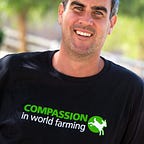Don’t Be a Sucker: This Rising Business Venture Must End Before It Begins
The release of Seaspiracy and My Octopus Teacher brought the plight of marine life right into living rooms across America, gaining public attention. In addition to microplastics and pyjama sharks however, oceans and octopuses in particular are facing a new threat — factory farming. Several farms are in early stages across the globe, and in 2017 the first commercial octopus farm in the U.S. was established on the Big Island of Hawai’i. While it claims to research and farm the animals in the name of conservation, evidence suggests it is doing more harm than good.
In the opening scene of My Octopus Teacher, we see a spherical conglomerate of mussel, whelk, and winkle shells held tightly together, until suddenly they fall away to briefly reveal the octopus inside before she glides off effortlessly from view into the depths. This moment is a culmination of the species’ ingenuity, curiosity, memory and fear, characteristics that set octopuses apart from other invertebrates and reasons why keeping these creatures in small, barren tanks for commercial use raises ethical concerns.
In 2012, the Cambridge Declaration of Consciousness affirmed a scientific consensus that “humans are not the only conscious beings and that non-human animals, including all mammals and birds, and many other creatures, including octopuses possess neurological substrates complex enough to support conscious experiences.” But what does this actually mean? In both lab studies and field observations, octopuses have shown their ability to reason, plan, remember and play. Octopuses are part of the less than 1% of animals that use tools and they also have distinct personalities, each reacting differently (fear, aggression, intrigue, etc.) to identical situations.
Octopuses on a factory farm, however, have little opportunity to play, explore, build, or reason. The Kanaloa Octopus Farm in Hawai’i features a petting area where it charges tourists to touch and feed them. It keeps each octopus in a plastic container the size of a slop sink, with no sand, rocks, shells, kelp, coral structures or other natural features. The only object in the tanks is a hut, which offers minimal shelter from the onslaught of visitors’ hands reaching into the tank every day. Octopus normally live in a vast, complex and ever-changing environment, where they are exposed to visual, chemical, and tactile stimuli. The containers at the farm are devoid of any chemical changes, prey to hunt, predators to hide from, fish to live amongst, or resources to build a shelter with.
The farm touts itself as a solution to overfishing, but there are two glaring problems. First, octopuses are notoriously impossible to breed in captivity. Since the Kanaloa farm’s opening in 2017 it has tried various ways to reliably raise octopus larvae, but has been unsuccessful, which it admits on its website and on tours. The mortality rate of octopuses in farms like these is 20% at best, and sometimes 30–40%. They are easily injured or killed by mishandling or changes in salinity, temperature, and oxygen. Second, octopuses are carnivores, so when farmed they must be fed fishmeal and fish oil. That means even more fish need to be harvested from the ocean, not less, pushing ocean fish stocks closer to being “empty by 2048” as Seaspiracy gravely warns and collapsing not only the fishing industry but also the entire ocean food web.
There are currently no significant laws regulating octopus welfare and farming practices, putting thousands at risk of pain, suffering, and lasting harm in farms like Kanaloa. Compassion in World Farming released a report on the ethical and environmental risks of the industry, and an open letter advising against the pursuit of octopus farming has been signed by over 100 scientists.
Some people think invertebrates are a summation of instincts; Creatures who have been programmed by thousands of years of natural selection, running on autopilot. But for octopuses, this is simply not the case. These animals have personalities, memories, fears, and a curiosity that goes far beyond basic survival. Once again nature shows us that some parts of her cannot be tamed. As the third largest consumer of octopus, the United States is positioned to say “no” to octopus farming before it’s too late.
